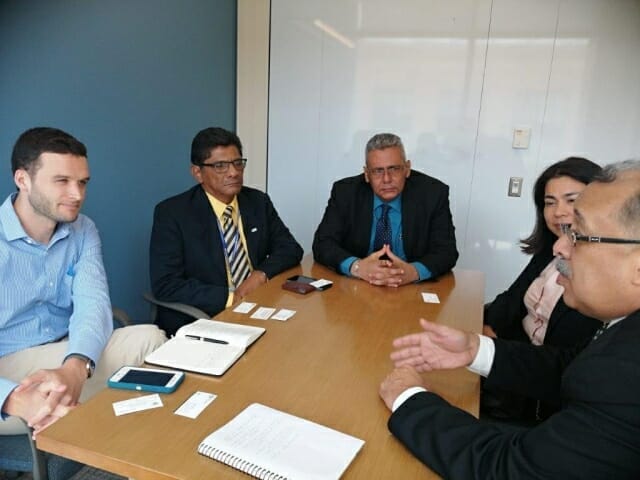News > Blog
Community Volunteers Lead the Way to Zika Prevention in Honduras
Published 06/10/2019 by Global Communities

Zika, the mosquito-borne virus that can cause birth defects was rampant in Honduras three years ago, with about 36,000 cases, and a fear that the number could only rise. This year as Global Communities’ USAID-funded Nuestra Salud (Our Health) program ends there are only about 600 cases.
The success is greatly due to the training of 1,200 community volunteers and 1,100 teachers to change behaviors in their neighborhoods through understanding of mosquito sites and breeding conditions and education on the sexual transmission of Zika.
One of these volunteers is Don Héctor, 59, a long-time leader in his community of Colonia Flor del Campo near Tegucigalpa. Part of his work is to educate his neighbors that they must rid the area of unnecessary standing water to eliminate mosquito breeding grounds.
“Here we are together with churches, schools and colleges, water boards, networks of voluntary health collaborators and other organizations and community leaders. We meet monthly to plan, execute and evaluate the activities that we develop in the community,” says Don Héctor.
The Global Communities Honduras team meets with congressional staff on May 6, 2019. L-R – Congressional staff member, Olman Rivera, Dr. Mario Cooper, Eva Meija, Jose R. Gomez.
“We are very satisfied with the results obtained, but there is a lot to do,” concludes Don Héctor.
The Nuestra Salud program targets poor and dense urban areas in five of Honduras’ most affected municipalities: Tegucigalpa, San Pedro Sula, Choloma, La Lima and Villanueva, reaching 36 Health Facilities and 360 most at risk communities. The symptoms of Zika – fever, rash, headache and joint pain, are rarely severe enough to send people to the hospital, but a pregnant woman can pass it on to her unborn child who may suffer brain defects such as microcephaly.
Global Communities’ Honduras team recently met with lawmakers and media in Washington where they discussed their success against Zika, HIV/AIDS, malaria, dengue and chikungunya and other projects such as watershed management in Honduras Dry Corridor, which is giving farmers a more reliable water supply. These projects help give Hondurans hope for a healthier and more prosperous future in their own country.
Visit this link to view one of our health volunteers providing a demonstration on preventing Zika.




